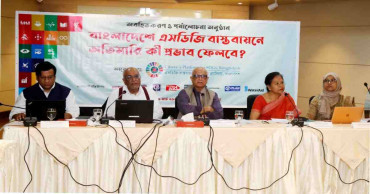Dr. Debapriya Bhattacharya
Bangladesh stands on the edge of deep ditch before the polls: Dr Debapriya
Bangladesh’s three big challenges in the fields of economy, international relations, and politics are likely to get deeper centering the January 7 parliamentary elections, Dr. Debapriya Bhattacharya, distinguished fellow of Centre for Policy Dialogue has said.
“Bangladesh today stands on the edge of a deep ditch,” he said adding that the problems faced by the country are likely to worsen if the upcoming polls become one-sided.
The eminent economist shared his views on a wide range of issues from ongoing political unrest to economic situation and to international interest in an interview with UNB in Dhaka this week.
208 vehicles set on fire across the country since Oct 28
Political unrest and a one-party election will deepen the uncertainty in the economic sector further as around 80 percent population of Bangladesh wants a fair and internationally acceptable election that is very much needed for sustainable economic growth, Dr Debapriya said.
Regarding elections without the participation of big political parties, he said the Election Commission is creating political parties giving registration as per their wish.
The country is now getting the attention of global powers as they have different interests here. They are watching whether the upcoming election will be like previous ones or inclusive and participatory.
Regarding economic challenges, he said people have been bearing the brunt of inflation for a long time, while many countries have improved in this sector after the pandemic and during the Russia-Ukraine war.
Here the food inflation is around 12 percent and inflation in rural areas is more than in the urban areas, which was not seen earlier, he noted.
Tilted Ctg building: 7-member probe body formed
According to him due to the continuous slide of the domestic currency taka, people have to face imported inflation.
There is no visible sign of reducing this type of inflation in the recent months, Dr Debapriya said.
He said the revenue generation fell severely due to an import decrease by one-fourth in recent past years. He said the inefficiency of the revenue board has resulted in low collection of revenue.
The government cannot implement already promised development work at the local government level, even in the election year, he mentioned.
This stagnation will not go until an inclusive and free fair parliamentary election, which is necessary to establish accountability in every sector- is held, he said.
He said the drastic fall of imports pushed price hikes in the domestic market and a group of syndicates using this as an option for raising prices.
The revenue shortfall is widening, corruption and money laundering not reducing despite raising individual and overall income, which is happening due to lack of accountability. The government cannot ensure accountability at the top to bottom level as they are dependent on bureaucrats and state agencies in absence of political and moral legality, he pointed out.
Not only that but also some influential countries are interfering in the domestic matter of Bangladesh, which never happened earlier. All of these are the outcome of faulty elections here and they (foreigners) are taking political disagreement and lack of moral legality of the government as an opportunity, he opined.
Regarding the legitimacy of past elections Dr Debapriya said those elections had been legal in consideration of the constitution, but there was a lack of political and moral legality, he said.
20-year-old dies falling from 8-storey building in Dhaka’s Sher-e-Bangla Nagar
A country becomes stronger when its independent state organs are strengthened, he said adding in Bangladesh both the constitutional institutions and other state agencies are playing a biased role.
Regarding labour rights, Dr Debapriya said the Western world expresses concern over the working environment, illegal harassment, and forced disappearance of labour rights activists. Western people, who are the buyers of Bangladeshi garments and other goods, are very much conscious and concerned about these issues.
Bangladesh has to reform many areas, such as recovery of huge defaulted loans, reduce money laundering, ensure decent working environment and express their views without fear, he said.
In the diplomatic sector, the country has to balance with global power keeping in mind that export destination of Bangladeshi goods, manpower, and remittances.
2 years ago
Form expert committee to review govt data: Debapriya
Dr. Debapriya Bhattacharya, distinguished fellow of CPD, on Thursday urged the government to form an expert committee to review existing data to make it correct and justify fact and figure with actual situation.
This is needed to exit from “data blindness and non-credibility of data”, he said “otherwise the policy will be prepared depend on immature data, and its effect would dangerous.”
His remarks came in a review session on “What Impact Will Pandemic Have on SDGs Delivery in Bangladesh?”, organized by the Citizen’s Platform for SDGs, Bangladesh on Thursday, in the capital.
He said without credible and updated data, policy focused on which level, for whose and where cannot be determined. As a result Bangladesh's sustainable development goals (SDGs) achieved will be given in the right point and right places.
Read: TCB to procure huge sugar, chickpea, lentil and edible oil for Ramadan supply
The program discussed the aforesaid issues and proposed tangible policy measures, particularly in view of the upcoming national budget of fiscal year (FY)2022-23.
Debapriya said SDGs achieving progress slips the target due to the effect of Covid-19 pandemic and data dearth as well as non-credible information.
The data of government entities even faces credibility problems as those consequences are not being matched with different economic and social context which needs reform first to implication of policy, he said.
Dr Debapriya, also the convener of Citizen’s Platform for SDGs, Bangladesh , in his keynote presentation, shared the findings of a study conducted by the Citizen’s Platform, which assessed the impact of COVID-19 on the delivery of SDGs in Bangladesh from the perspectives of the disadvantaged population groups.
The immediate focus must be on protecting the purchasing power of the disadvantaged people by controlling the cost of basic living and enhancing income opportunities.
The government should immediately reduce duties, tariffs and taxes to make prices of essentials more affordable and provide access to basic commodities at “fair prices” by expanding open market sales (OMS) operations of TCB.
The government should expand public works, social protection programe and food assistance and increase the tax rebates for job creation. Public resources will need to be redirected for subsidy to protect prices of electricity, fuel, food and fertilizer, stated in the paper.
Debopriya said given the resource constraint, the government will need to use public money under ADP more efficiently and accelerate investment in the rural public health system and address education loss, he said.
Read: Come and make Bangladesh your home, Hasina tells UAE investors
“The upcoming national budget of FY22-23 should be designed in the context of following recent developments which threaten to raise vulnerabilities of the disadvantaged. Overall policy approach should be towards using SDG as a framework for post-pandemic recovery by prioritizing public expenditure on education and health in view of COVID losses. Additionally, the SDG tracker should be updated urgently,” Debapriya stated.
Professor Mustafizur Rahman, Core Group Member, Citizen’s Platform for SDGs, Bangladesh and Distinguished Fellow, Centre for Policy Dialogue (CPD) discussed social protection and has demanded to expand the social safety net adequately in urban and peri-urban areas. To this end, lack of data and information is obstructing the government to reach the people in need.
Dr Ahmed Mushtaque Raza Chowdhury, Core Group Member, Citizen’s Platform for SDGs, Bangladesh and Convener, Bangladesh Health Watch (BHW), Zakir Hossain, Chief Executive, Nagorik Uddyog, Reefat Bin Sattar, Director – Programme Development and Quality, Save the Children in Bangladesh, Syeda Rizwana Hasan, Chief Executive, Bangladesh Environmental Lawyers Association (BELA), Dr Mostafizur Rahaman, Program Manager, Campaign for Popular Education (CAMPE) on Education, Khandekar Jahurul Alam, Executive Director, Centre for Services and Information on Disability (CSID) on Rights of Persons with Disabilities, Raju Bashfor, General Secretary, Horijon Eikko Parishad, Thakurgaon District on Dalit, Anisatul Fatema Yousuf, Coordinator, Citizen’s Platform for SDGs, among others, spoke at the function.
3 years ago



